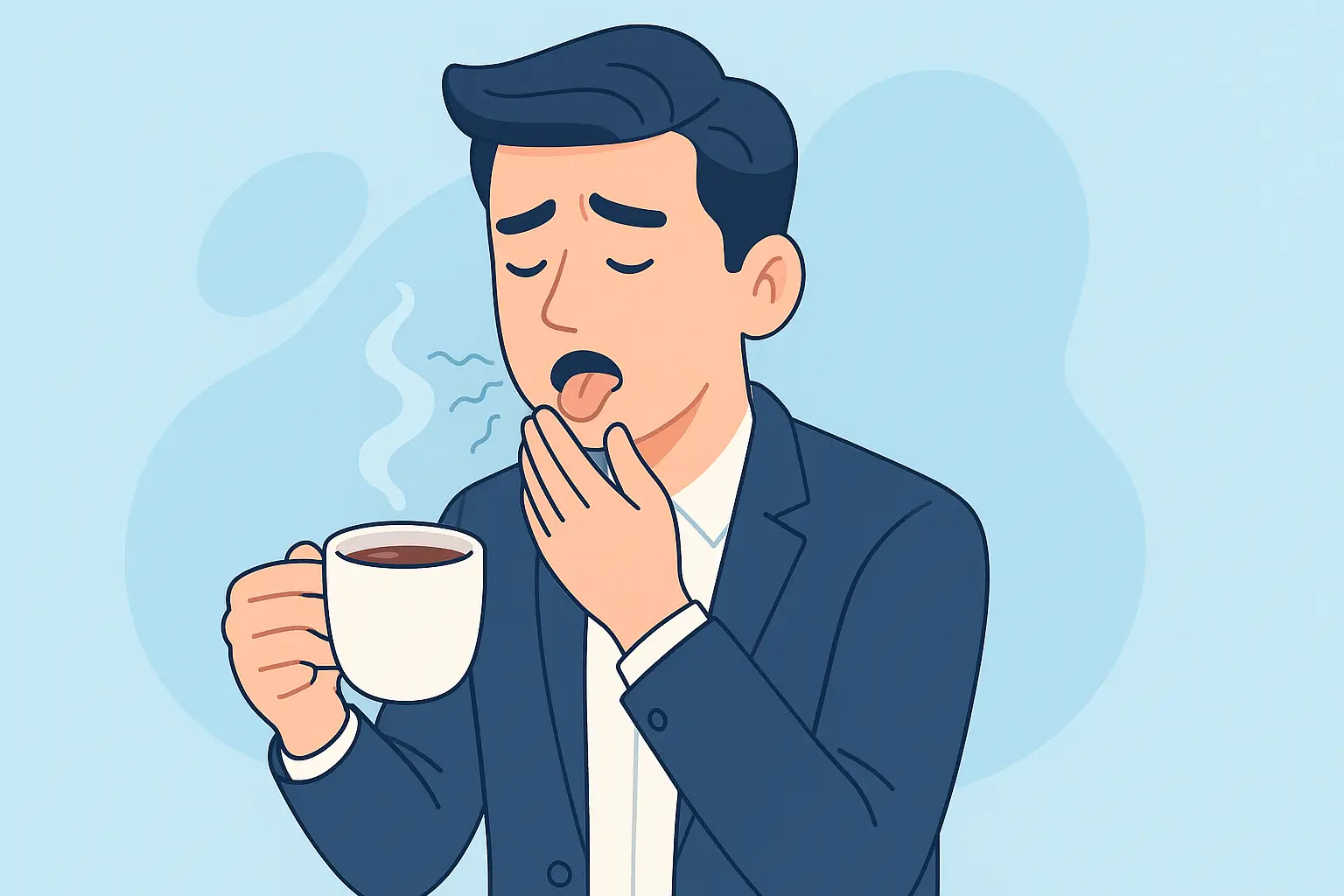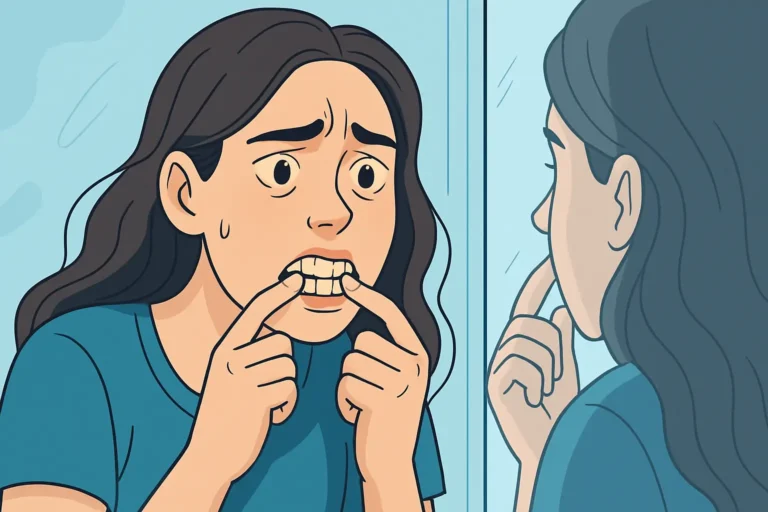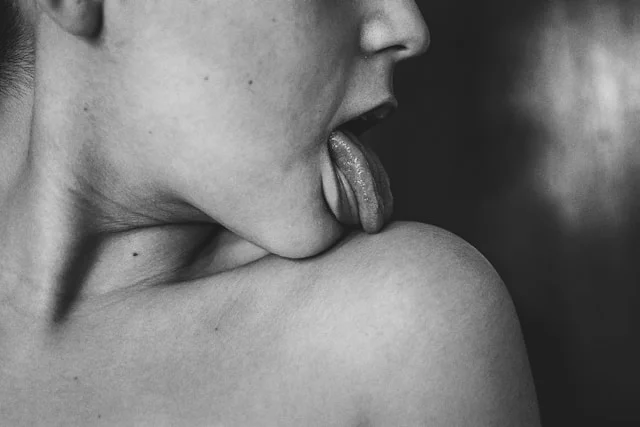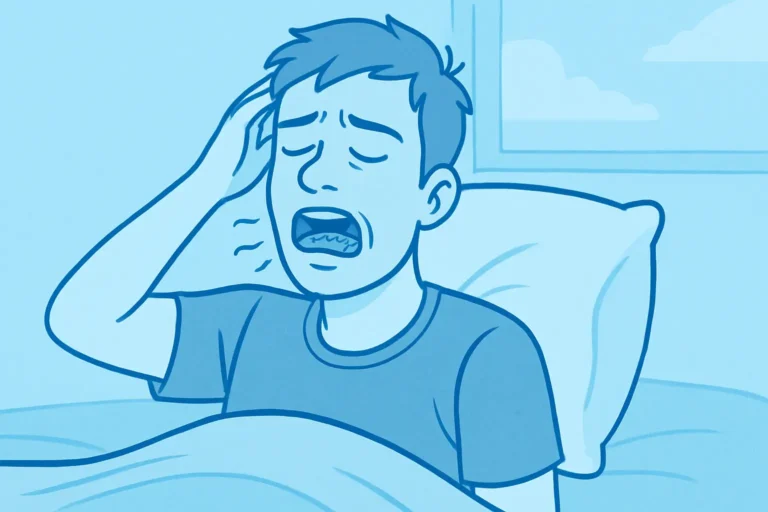Dry Mouth After Coffee — What to Do
You love your morning coffee, but some days it leaves your mouth feeling like cotton.
That sticky, dry sensation can make it harder to taste, swallow, or even talk comfortably.
The good news: you don’t have to give up coffee to fix it. Let’s break down why coffee causes dry mouth, what you can do immediately, and how to prevent it long term.
What’s Actually Happening — Why Coffee Can Make Your Mouth Dry
Caffeine’s Drying Effect
Caffeine stimulates your nervous system, and part of that stimulation reduces saliva flow for some people.
Less saliva means your mouth loses its natural moisture and protection against bacteria.
Coffee Acids and Tannins
Coffee is naturally acidic and full of tannins — compounds that can leave a dry, puckering feeling (kind of like red wine does).
They bind to proteins in your saliva, reducing that smooth, lubricated feel in your mouth.
Mouth Breathing and Dehydration
Hot coffee encourages some people to breathe through their mouths while sipping, which dries out oral tissues.
Plus, coffee acts as a mild diuretic — meaning you might lose a bit of water through urine if you’re not hydrating alongside it.
Other Contributing Factors
If you take certain medications (like antihistamines or antidepressants), smoke, or have a health condition that affects saliva (like diabetes or Sjögren’s syndrome), coffee can amplify dryness.
Quick Fixes You Can Use Right Away
Sip Water With Your Coffee
This simple trick works wonders.
Take a few sips of water after each sip of coffee to rinse acids, refresh your mouth, and replace lost moisture.
Chew Sugar-Free Gum or Suck on a Xylitol Lozenge
Chewing helps your salivary glands wake up.
Xylitol also protects against cavity-causing bacteria, which is a bonus when saliva is low.
Try an Oral Moisturizing Spray or Saliva Substitute
Over-the-counter sprays and gels can instantly relieve dryness.
Look for products labeled “saliva substitute” or “dry mouth spray” — often glycerin-based and safe for daily use.
Avoid Alcohol-Based Mouthwashes
Alcohol in mouthwash can sting and dry your tissues further.
Instead, choose alcohol-free rinses formulated for dry mouth.
Keep Your Lips and Tongue Moist
Hydrating lip balm and small sips of water can keep your lips from cracking and reduce that rough, papery feeling.
Coffee Tweaks That Make a Big Difference
Switch to Decaf or Lower-Caffeine Blends
Less caffeine means less stimulation to the nervous system — and often, less dryness.
Try half-caf or naturally low-caffeine beans like Arabica varieties.
Add Milk or a Milk Alternative
A splash of milk can soften the acidity and coat your tongue slightly, easing the dry, astringent feeling.
It’s not a magic fix, but it helps.
Try Cold Brew or Low-Acid Coffee
Cold brew has up to 60% less acid than hot coffee.
That makes it gentler on your mouth and less likely to trigger that chalky, coated sensation.
Shorten Your Sip Sessions
Instead of sipping coffee over several hours, drink it within a shorter time frame.
You’ll reduce your mouth’s exposure to acids and dryness.
Daily Habits to Prevent Dry Mouth
Stay Hydrated All Day
Saliva production depends heavily on your body’s hydration.
Aim to drink water steadily through the day — not just after coffee.
Chew Sugar-Free Gum After Meals and Coffee
It’s an easy, natural way to stimulate saliva and keep your mouth clean between brushings.
Avoid Tobacco and Limit Alcohol
Both reduce saliva flow and make oral tissues less healthy.
Even “social” amounts can compound dryness if you’re already sensitive.
Use a Humidifier at Night
Dry indoor air (especially in winter or with AC running) can leave you waking up parched.
A humidifier helps your mouth stay moist overnight.
Keep Up With Good Oral Hygiene
Brush twice a day with fluoride toothpaste, floss daily, and see your dentist regularly.
They can check for cavities, fungal infections, or any damage from chronic dryness.
Foods and Drinks That Help (and Hurt)
What Helps
- Water — the simplest and best fix.
- Herbal teas — caffeine-free and soothing.
- Crunchy fruits and veggies — apples, carrots, celery stimulate saliva.
- Broths or soups — gentle hydration if you’re tired of plain water.
- Mild citrus — lemon water (diluted) can gently trigger saliva.
What to Limit
- Sugary drinks — sugar feeds bacteria, and without enough saliva, cavities can form fast.
- Alcohol — dries tissues and slows saliva production.
- Acidic sodas or juices — can irritate the mouth when it’s already dry.
If you use lemon or lime for stimulation, rinse or drink plain water afterwards — that helps protect your enamel.
Over-the-Counter Products Worth Trying
Sugar-Free Xylitol Gum or Mints
These are dentist-approved for a reason — they stimulate saliva without sugar.
Brands like Spry or Trident Xylitol are easy to find.
Moisturizing Mouth Sprays and Gels
Products like Biotène or Mouth Kote provide instant, temporary relief and are great before bed or speaking engagements.
Toothpaste and Rinses for Dry Mouth
Specialized toothpaste (Biotène, Sensodyne Dry Mouth) uses mild ingredients and moisturizers that help protect sensitive tissue.
They’re a good swap if your regular toothpaste feels harsh.
Just avoid sugary candies or mints — they can make cavities worse when saliva is low.
When Dry Mouth Is More Than Just Coffee
Medication Side Effects
Hundreds of medications can cause dry mouth — from antidepressants and antihypertensives to allergy meds and pain relievers.
If dryness started after a medication change, talk to your doctor or pharmacist.
Health Conditions
Chronic dryness can also point to underlying issues like diabetes, Sjögren’s syndrome, thyroid problems, or dehydration from illness.
If you have ongoing symptoms, don’t assume coffee is the only cause.
Lifestyle Factors
Smoking, vaping, recreational drugs, or even frequent mouth breathing can worsen dryness.
Cutting back or changing those habits often helps more than you’d expect.
When to See Your Dentist or Doctor
Visit Your Dentist If:
- You’re getting more cavities than usual
- Your tongue burns or feels coated
- You have trouble wearing dentures
- You notice white patches or bad breath that won’t go away
Visit Your Doctor If:
- Dry mouth is new, severe, or constant
- You’re also experiencing fatigue, weight changes, or joint pain
- You take multiple medications that could interact
Bring a list of your medications — even over-the-counter ones.
Your healthcare provider might adjust dosages or switch you to an option with fewer side effects.
A Simple Morning Routine to Try Tomorrow
- Before coffee: drink a full glass of water.
- During coffee: alternate sips of coffee with sips of water.
- After coffee: chew sugar-free gum or use a moisturizing spray.
- Midday: stay hydrated and breathe through your nose when possible.
- Nighttime: brush with a gentle, fluoride toothpaste and run a humidifier.
Repeat this for a week and you’ll likely notice less dryness — without giving up your daily cup.
The Bottom Line
Dry mouth after coffee is common, but not something you have to live with.
It’s usually a mix of caffeine, acidity, and hydration habits — all of which you can tweak easily.
By pairing coffee with water, choosing lower-acid options, and keeping your mouth moisturized, you can enjoy your favorite brew comfortably.
If dryness persists or worsens, it’s worth a chat with your dentist or doctor to rule out other causes.
With a few small changes, you can keep your mouth healthy and your coffee ritual intact.







